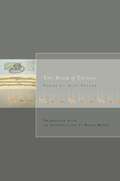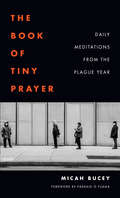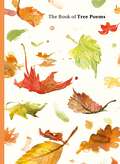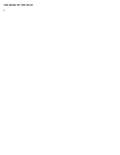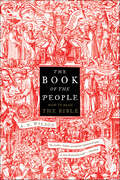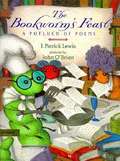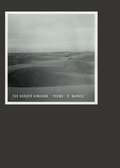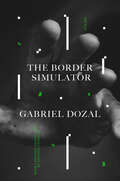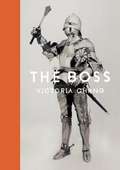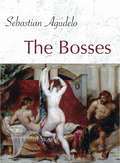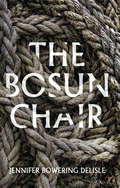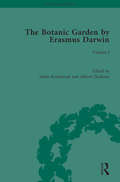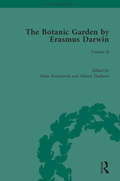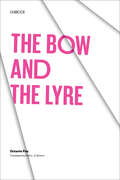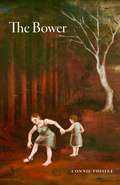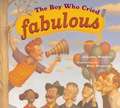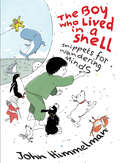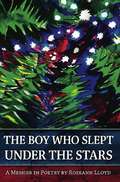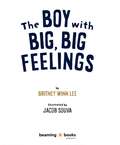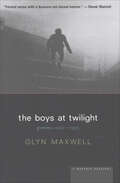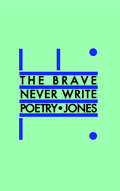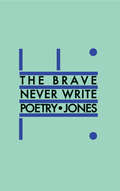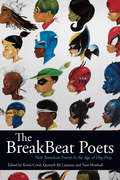- Table View
- List View
The Book of Things (Lannan Translations Selection Series #18)
by Ales StegerFrom his first book of poems, Chessboards of Hours (1995), Aleš Šteger has been one of Slovenia's most promising poets. The philosophical and lyrical sophistication of his poems, along with his work as a leading book editor and festival organizer, quickly spread Šteger's reputation beyond the borders of Slovenia. The Book of Things is Šteger's most widely praised book of poetry and his first American collection. The book consists of fifty poems that look at "things" (i.e. aspirin, chair, cork) which are transformed by Šteger's unique poetic alchemy.Translator Brian Henry is a distinguished poet, translator, editor, and critic.From Publisher’s Weekly:Steger’s efforts sometimes bring to mind such Western European figures as Francis Ponge and Craig Raine, who also sought to make household things look new and strange. Yet Steger brings a melancholy Central European sense of history- his objects tend to remember, or cause, great pain: "It pours, this poisonous, sweet force,” Steger writes of "Saliva,” "Between teeth, when you spit your own little genocide.” (Nov.)From Guernica, a Magazine of Art and Politics:It is a rare treat to have an English translation before the ink has dried on the original. By which I mean, a mere five years after the book’s Slovenian publication, Brian Henry has brought these poems to life for those of us not lucky enough to read Slovenian. Henry’s translations are impressive for sheer acrobatics.
The Book of Tiny Prayer: Daily Meditations from the Plague Year
by Micah BuceyBearing witness to the first year of the COVID-19 pandemicWhen New York City went into lockdown in March 2020, spiritual leader Micah Bucey found the world and himself in desperate need of prayer. While social distancing created disconnect, Bucey began a daily practice of writing a “Tiny Prayer” each morning and posting it on social media, each offering a reflection on what was going on in his own heart and in the wider world. Soon, a solitary practice became a communal one, with others engaging and sharing the prayers that touched them most, suggesting issues and topics for future prayers, and creating connection across a digital divide.Over the course of a year filled with fear and faith, protest and possibility, Bucey composed prayers for frontline workers and activists, those lost to illness and wins for democracy, for civic leaders, celebrities, and everyday emotions. While overwhelm threatened to engulf us all, these short meditations invited a combination of attention and intention in bite-sized form that aided the reader in focusing on one issue at a time, from the rise of infections, hospitalizations, and deaths, to police violence, social justice uprisings, immigrant detentions, catastrophic climate events, mass shootings, and violent right-wing insurrections. Now, all 366 “Tiny Prayers” are collected here, together forming a chronicle of a specific moment in time and modeling a form for everyone to compose their own tiny prayers to engage the everyday around them. The Book of Tiny Prayer recalls a very particular year, but its spirit is universal, inviting all to quiet themselves, name the pain and the joy around them, and recommit to the change required for collective liberation, during the worst times and far beyond.
The Book of Tree Poems
by Sarah MaycockCould there be a more pleasant way to spend a warm afternoon than lazing under a tree reading poetry inspired by these shade-giving wonders of the world? Trees have sparked some of the biggest literary imaginations over the ages and - as the climate emergency escalates - it has never been more important to appreciate our vital connection to them. This beautifully illustrated anthology of sixty tree poems is a celebration of our love of trees. With poems by some of the world's best-loved poets including Philip Larkin, Ted Hughes, Carol Ann Duffy, Thomas Hardy and Elizabeth Barrett Browning, The Book of Tree Poems will help you see trees as you've never seen them before.
The Book of Tree Poems
by Sarah MaycockCould there be a more pleasant way to spend a warm afternoon than lazing under a tree reading poetry inspired by these shade-giving wonders of the world? Trees have sparked some of the biggest literary imaginations over the ages and - as the climate emergency escalates - it has never been more important to appreciate our vital connection to them. This beautifully illustrated anthology of sixty tree poems is a celebration of our love of trees. With poems by some of the world's best-loved poets including Philip Larkin, Ted Hughes, Carol Ann Duffy, Thomas Hardy and Elizabeth Barrett Browning, The Book of Tree Poems will help you see trees as you've never seen them before.
The Book of the Dead
by Muriel Rukeyser Catherine Venable MooreWritten in response to the Hawk’s Nest Tunnel disaster of 1931 in Gauley Bridge, West Virginia, The Book of the Dead is an important part of West Virginia’s cultural heritage and a powerful account of one of the worst industrial catastrophes in American history. The poems collected here investigate the roots of a tragedy that killed hundreds of workers, most of them African American. They are a rare engagement with the overlap between race and environment in Appalachia. <p><p>Published for the first time alongside photographs by Nancy Naumburg, who accompanied Rukeyser to Gauley Bridge in 1936, this edition of The Book of the Dead includes an introduction by Catherine Venable Moore, whose writing on the topic has been anthologized in Best American Essays.
The Book of the People: How to Read the Bible
by A.N. WilsonFrom renowned historian, biographer and novelist, A.N. Wilson, a deep personal, literary, and historical exploration of the Bible. In The Book of the People, A. N. Wilson explores how readers and thinkers have approached the Bible, and how it might be read today. Charting his own relationship with the Bible over a lifetime of writing, Wilson argues that it remains relevant even in a largely secular society, as a philosophical work, a work of literature, and a cultural touchstone that the western world has answered to for nearly two thousand years: Martin Luther King was "reading the Bible" when he started the Civil Rights movement, and when Michelangelo painted the fresco cycles in the Sistine Chapel, he was "reading the Bible." Wilson challenges the way fundamentalists—whether believers or non-believers—have misused the Bible, either by neglecting and failing to recognize its cultural significance, or by using it as a weapon against those with whom they disagree. Erudite, witty and accessible, The Book of the People seeks to reclaim the Good Book as our seminal work of literature, and a book for the imagination.
The Bookworm's Feast
by J. Patrick Lewis John O'Brien Michele FoleyA collection of poems on a variety of topics organized according to the courses of a meal.
The Border Kingdom: Poems
by D. NurkseIn a collection of urgent and intimate poems, D. Nurkse explores the biblical past and the terrifying politics of the present with which it resonates, the legacy of fathers and the flawed kingdoms they leave their sons.In "Ben Adan," a stunning poem in the opening sequence of the collection, we witness the stirring drama between a captor and the prisoner commanded to dig his own grave ("perhaps in a moment / he will lift me up / and hold me trembling, / more scared than I / and more relieved"). "After a Bombing" examines children's drawings as deep symbolic reactions to 9/11. The subtly majestic "Lament for the Makers of Brooklyn" builds the poignant case for a lost world: "Where is Policastro the locksmith now?" the poet asks. "Half-blind, he wore two pairs of glasses / held together by duct tape, / . . . / afterward the key turned / for you but not for me."A poet of unique force and sensitivity, Nurkse refuses to pass over the marginal characters and corners of the world, attuned to the scraps of beauty or insight they might offer up in the midst of moral darkness. In The Border Kingdom he has given us an exceptionally powerful collection of poems--unfailingly rich in imagery, undaunted in subject and spirit.JerichoSometimes in a high window a white curtain knotted against itselfgives a glimpse of the loversas they were before the war:with great concentration and silencethey undo a mother-of-pearl snapwhile a cat perched on the silllooks down with burning eyes.From the Hardcover edition.
The Border Simulator: Poems
by Gabriel DozalA world-bending, lyrically rich poetry collection that reimagines the U.S.-Mexico border as both a real place and a living simulation—and tells the story of a pair of siblings trapped between the two&“Word coyote Gabriel Dozal is crossing borders with this story. It&’s his job: narrative poetry discovering a new language.&”—Sandra Cisneros, author of Woman Without Shame&“This crosser is a possession that someone wants but we&’re not sure whoand the crosser must often possess themselves. In perpetuity&”In Gabriel Dozal&’s debut collection, the U.S.-Mexico border is redefined as a place of invention; crossing it becomes a matter of simulation. The poems accompany Primitivo, who attempts to cross the border, an imaginary boundary that becomes more real and challenging as his journey progresses; and his sister, Primitiva, who lives an alternate, static life as an exploited migrant worker in la fabrica. The tech world and bureaucracy collide, with humanity falling by the wayside, as Primitiva endures drudgery in la fabrica. &“In the past our ID cards were decorative. Now we switch off with someone else, another worker who will wipe the serenade from our eyes.&” With no way to escape the simulation, Primitivo and Primitiva must participate in it, scheming to gain its favor. To win, you must be the best performer in the factory, the best imitation of a citizen, the best machine.Featuring a bilingual format for English and Spanish readers, The Border Simulator explores physical and metaphysical borders, as well as the digital divide of our modern era. With inventive imagery, spirited wordplay, and thrilling movement, these energetic poems oscillate between the harrowing and the joyful, interrogating, innovating, and ultimately redefining binaries and divisions.
The Boss (McSweeney's Poetry Series)
by Victoria ChangWritten in “a breathless kind of fury,” the poems in award-winning poet Victoria Chang’s virtuosic third collection The Boss dance across the page with the brutal power and incandescent beauty of spring lightning. <P><P>Obsessive, brilliant, linguistically playful—the mesmerizing world of The Boss is as personal as it is distinctly post-9/11. The result is a breathtaking, one-of-a-kind exploration of contemporary American culture, power structures, family life, and ethnic and personal identity.
The Bosses
by Sebastian AgudeloAgudelo’s books have always been concerned with the relationship between worker and consumer, whether in the kitchens or in the neighborhood, but in The Bosses, his spectacular third outing, Agudelo’s sharp focus finally lands on the seen and unseen authority figures who dictate the boundaries of our lives, contemplating power structures from the current managerial culture to a historical exploration of the role that authority plays in our lives.
The Bosun Chair
by Jennifer Bowering DelislePart family memoir, part poetry, part love letter to Newfoundland and its people, The Bosun Chair is a lyrical exploration of how we are fortified by the places of our foremothers and forefathers and by how they endured.Like 'ballycater,' the ice that gathers in harbours along the coast, Jennifer Bowering Delisle gathers fragments of history, family lore, and poetry—both her own and that of her great-grandparents—to tell stories of shipwrecks, war, resettlement, and men and women's labour in early twentieth-century Newfoundland. With deftness and haunting imagery, The Bosun Chair reveals the inherent gaps in ancestral history and the drive to understand a story that can never fully be told.
The Botanic Garden by Erasmus Darwin: Volume I (The Pickering Masters)
by Adam KomisarukThe career of Erasmus Darwin (1731-1802) affords an extraordinary glimpse into the intellectual ferment of late-eighteenth- and early-nineteenth-century Britain. As a popular poet, practicing physician, inventor of speaking machines and mechanical birds, essayer of natural history from geology to meteorology, and proponent of an evolutionary theory that inspired his famous grandson Charles, he left a lasting impression on almost every branch of knowledge. His magnum opus, and the synthesis of his myriad interests, is The Botanic Garden (1792) — an epic poem that aims to "enlist the Imagination under the banner of Science." Part I, The Economy of Vegetation, sings the praises of British industry as a dance of supernatural creatures while part II, The Loves of the Plants, wittily employs metaphors of human courtship to describe the reproductive cycles of hundreds of flowers. Darwin supplements his accomplished verses with (often much longer) "philosophical notes" that offer his idiosyncratic perspective on the scholarly controversies of the day. Despite a recent surge of academic interest in Darwin, however, no authoritative critical edition of The Botanic Garden exists, presenting a barrier to further scholarship. This two volume set comprises a complete, meticulously transcribed, reading text — including all the poetry, prose apparatus, and illustrations — along with extensive commentary that situates Darwin within contemporary debates about the natural sciences. This set will be of interest to readers as the definitive reference edition of The Botanic Garden and due to its efforts to make the work more practically and intellectually accessible to seasoned and novice readers alike. The first volume presents a wide ranging and authoritative introduction to The Botanic Garden, detailing the background to the work and the various contexts in which it should be understood. These include: aesthetic theory and practice, the science of the mind, love and sexuality, politics, spirituality, the natural sciences, and evolutionary theory and the two Darwins. The full text of Part I of the The Botanic Garden, The Economy of Vegetation, then follows accompanied by the editors’ annotations, discussion of illustrations and textual notes.
The Botanic Garden by Erasmus Darwin: Volume II (The Pickering Masters)
by Adam KomisarukThe career of Erasmus Darwin (1731-1802) affords an extraordinary glimpse into the intellectual ferment of late-eighteenth- and early-nineteenth-century Britain. As a popular poet, practicing physician, inventor of speaking machines and mechanical birds, essayer of natural history from geology to meteorology, and proponent of an evolutionary theory that inspired his famous grandson Charles, he left a lasting impression on almost every branch of knowledge. His magnum opus, and the synthesis of his myriad interests, is The Botanic Garden (1792) — an epic poem that aims to "enlist the Imagination under the banner of Science." Part I, The Economy of Vegetation, sings the praises of British industry as a dance of supernatural creatures while part II, The Loves of the Plants, wittily employs metaphors of human courtship to describe the reproductive cycles of hundreds of flowers. Darwin supplements his accomplished verses with (often much longer) "philosophical notes" that offer his idiosyncratic perspective on the scholarly controversies of the day. Despite a recent surge of academic interest in Darwin, however, no authoritative critical edition of The Botanic Garden exists, presenting a barrier to further scholarship. This two volume set comprises a complete, meticulously transcribed, reading text — including all the poetry, prose apparatus, and illustrations — along with extensive commentary that situates Darwin within contemporary debates about the natural sciences. This set will be of interest to readers as the definitive reference edition of The Botanic Garden and due to its efforts to make the work more practically and intellectually accessible to seasoned and novice readers alike This second volume includes the full version of the second part of The Botanic Garden, The Lives of Plants along with the related textual apparatus consisting of the editors’ annotations, discussion of the illustrations, textual notes, and a taxonomic table of the flowers mentioned.
The Bow and the Lyre: The Poem, The Poetic Revelation, Poetry and History (Texas Pan American Series)
by Octavio PazOctavio Paz presents his sustained reflections on the poetic phenomenon and on the place of poetry in history and in our personal lives.
The Bow and the Lyre: The Poem. The Poetic Revelation. Poetry and History. (Texas Pan American Series)
by Octavio PazOctavio Paz presents his sustained reflections on the poetic phenomenon and on the place of poetry in history and in our personal lives.
The Bower (Phoenix Poets)
by Connie VoisineHow can a person come to understand wars and hatreds well enough to explain them truthfully to a child? The Bower engages this timeless and thorny question through a recounting of the poet-speaker’s year in Belfast, Northern Ireland, with her young daughter. The speaker immerses herself in the history of Irish politics—including the sectarian conflict known as The Troubles—and gathers stories of a painful, divisive past from museum exhibits, newspapers, neighbors, friends, local musicians, and cabbies. Quietly meditative, brooding, and heart-wrenching, these poems place intimate moments between mother and daughter alongside images of nationalistic violence and the angers that underlie our daily interactions. A deep dive into sectarianism and forgiveness, this timely and nuanced book examines the many ways we are all implicated in the impulse to “protect our own” and asks how we manage the histories that divide us.
The Boy Who Cried Fabulous
by Lesléa Newman"A young boy's fascination with everything he sees around him causes him to be late and upsets his parents, until they come to realize his special gift. So many colors, such a sight, it made him shriek with pure delight. "What a fabulous pie, can I have a slice? What a fabulous game, can I roll the dice?"
The Boy Who Lived in a Shell: Snippets for Wandering Minds
by John HimmelmanFrom the venerable John Himmelman comes something new—a collection of story poems perfect for fans of Shel Silverstein.Ivo lived in a great big shell.That floated in the sea.He wrote stories to make the time pass. Millions and millions of stories.More than a shell could hold.More than a boy&’s life could hold.A boy named Ivo lives in a giant moon snail shell on a beach. One day, a wave carries him out to sea. While he waits to be rescued, he makes the best of his time writing story poems on the walls inside the shell. In his poems, Ivo introduces you to characters such as dolphin, the nicest creature in the ocean who brings him a crayon when he needs a new one. Crab who takes over when Ivo sleeps and writes crabby poems. There&’s carrot boy who eats so many carrots that he turns into a rabbit. And two sibling pups taken in by different owners and can&’t stop looking for each other. John Himmelman&’s masterful collection of poems—each illustrated in full-color art—is filled with unforgettable characters and begs to be read time and time again.
The Boy Who Slept Under the Stars
by Roseann Lloyd"This a book about that place inside us all where bafflement meets mystery: a strange place, sometimes frightening and sometimes filled with stars and pines, clear flowing water and the deep joy of companionship."--Jim Moore Roseann Lloyd's new poetry collection takes us on a sister's unflinching exploration into grief for a brother lost on a solo hike in the Boundary Waters Canoe Area Wilderness in northern Minnesota. His clothes are found but not his body. How does one mourn without a body? This absence calls up memories of his life and mixed emotions; it evokes other disappearances--children missing in Iraq, climbers lost on Everest, a college student drowned. Even though I've said, for two years now, I don't need his bodyto do my mourning, I'm suddenly desperateto touch your arms, muscled and tan . . . Full of verbal energy and rich patterns of sound, Lloyd's lines are allowed to breathe and move about in always interesting forms: prose poems, found poems, section poems, swirling mosaics of time and place. Beautifully crafted, the poems are emotionally complex yet accessible. Roseann Lloyd has published eight books, including three poetry collections: Because of the Light (Holy Cow! Press), War Baby Express (Holy Cow! Press--awarded the Minnesota Book Award for Poetry), and Tap Dancing for Big Mom (New Rivers Press). The anthology she co-edited with Deborah Keenan, Looking for Home: Women Writing About Exile (Milkweed Editions) was awarded an American Book Award. She lives in Minneapolis, Minnesota.
The Boy with Big, Big Feelings (The Big, Big Series)
by Britney Winn Lee“Meet a boy with a heart so big, his feelings glow from his cheeks, spill out of his eyes, and jump up and down on his chest. What good is this giant heart?"
The Boys At Twilight: Poems 1990–1995
by Glyn MaxwellThe poems in this volume were selected by Glyn Maxwell from TALE OF THE MAYOR'S SON (published in 1990, when he was twenty-eight), OUT OF THE RAIN (shortlisted for the Whitbread Prize), and REST FOR THE WICKED. Maxwell “is a formalist,” wrote Robert McIlwaine about his first book, “but . . . he is an outspoken anti-elitist social poet. His strenuous well-wrought poems . . . come from an English tradition of technical virtuosity with plain speech.” The Boys at Twilight shows, sometimes comically, men at war, boys at play, boys grown up, men overreaching and reverting. Other concerns are the dangers of authority and mob psychology, the absurdities of stardom and consumerism, the heroism of the decent, and the wisdom of doubt. His subjects range from biblical stories to the “Tale of the Chocolate Egg,” which is a long, “pitch-perfect description of a bored young man’s growing obsession with a new kind of candy” (Adam Kirsch, New Republic). Always in his work, “Maxwell knows that to see into is not necessarily to see through . . . His virtuosity has a ballast of sobriety” (Poetry Book Society).
The Brave Never Write Poetry
by Daniel JonesFirst published in 1985, when Daniel Jones was just twenty-six, The Brave Never Write Poetry, the poet/critic/novelist's lone collection of poems, was a cult hit, turning 'poetry' on its head before its author (then known simply as 'Jones') swore off verse entirely. Written in a direct, plainspoken, autobiographical and at times confessional style in the tradition of Charles Bukowski and Al Purdy, these confrontational poems about sex and boredom, drugs and suicide, document Jones' depressive, alcoholic years as an enfant terrible. This long overdue revised edition brings Jones' unforgettable voice to a new generation of readers and includes the complete text of the original collection (including Jones' own sardonic assessments of his own poetry) and a new postscript essay by poet/critic Kevin Connolly.
The Brave Never Write Poetry
by Daniel JonesFirst published in 1985, when Daniel Jones was just 26, The Brave Never Write Poetry, the poet/critic/novelist's lone collection of poems, was a cult hit, turning 'poetry' on its head before its author (then known simply as 'Jones') swore off verse entirely. Written in a direct, plainspoken, autobiographical and at times confessional style in the tradition of Charles Bukowski and Al Purdy, these confrontational poems about sex and boredom, drugs and suicide, document Jones' depressive, alcoholic years as an enfant terrible. This long-overdue revised edition brings Jones' unforgettable voice to a new generation of readers and includes the complete text of the original collection (including Jones' own sardonic assessments of his own poetry), a new preface by poet/critic Kevin Connolly, and postscript commentary from many of Jones' closest friends and literary colleagues.
The BreakBeat Poets
by Kevin Coval Nate Marshall Quraysh Ali LansanaHip-Hop is the largest youth culture in the history of the planet rock. This is the first poetry anthology by and for the Hip-Hop generation.It has produced generations of artists who have revolutionized their genre(s) by applying the aesthetic innovations of the culture. The BreakBeat Poets features 78 poets, born somewhere between 1961-1999, All-City and Coast-to-Coast, who are creating the next and now movement(s) in American letters.The BreakBeat Poets is for people who love Hip-Hop, for fans of the culture, for people who've never read a poem, for people who thought poems were only something done by dead white dudes who got lost in a forest, and for poetry heads. This anthology is meant to expand the idea of who a poet is and what a poem is for.The BreakBeat Poets are the scribes recording and remixing a fuller spectrum of experience of what it means to be alive in this moment. The BreakBeat Poets are a break with the past and an honoring of the tradition(s), an undeniable body expanding the canon for the fresher.
